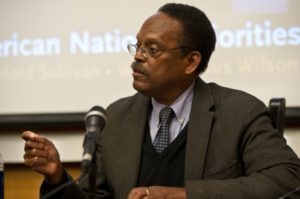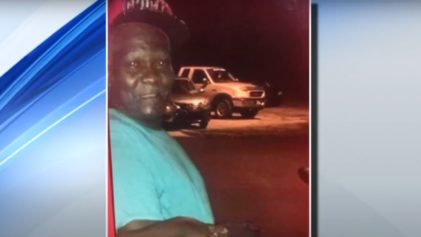By Cassie Chew
In the aftermath of protests that culminated in more than a dozen fires around Baltimore and ultimately brought 2,000 National Guardsmen to the streets to enforce a weeklong overnight curfew, lawmakers and activists are searching for ways to define the root cause the outrage.
But if you ask Harvard sociologist William Julius Wilson, who has studied residents of low-income and high-poverty areas as his life’s work, the seeds of discontent go back decades and are the result of the disappearance of work in this community.
Baltimore erupted after funeral services for Freddie Gray, who suffered a fatal spinal cord injury after six police officers detained and dragged the 25-year-old, who grew up in West Baltimore, into a police van.
The destruction illustrates the community’s raw feelings about the death of another young black man under the guise of law enforcement activity. But only partly. The raw display of discontent also represents pent-up frustrations among residents living in neighborhoods that for decades have languished in poverty while other parts of the city and Maryland—the wealthiest state in the country—are flourishing.
Wilson says that the answer to solving this problem is simple—create jobs in these neighborhoods.
More than 25 years after he published his groundbreaking research in The Truly Disadvantaged: The Inner City, The Underclass and Public Policy (1987), which links poor neighborhoods to the often tragic outcomes of the people living in them, Wilson says that the lack of business and economic activity in these areas continues to lock inner cities and their residents in cycle of poverty. These neighborhoods ultimately fall victim to economic depression, abandoned buildings and crime.
“Inner-city joblessness is often overlooked when the focus is on poverty and its consequences,” the Harvard scholar said earlier this month to an audience of educators, students and community residents at an event on the campus of Montgomery College, a two-year school on the border of Maryland and the District of Columbia. Wilson is in the nation’s capitol this spring as a scholar-in-residence at the U.S. Library of Congress.
“Joblessness leads to poor social organization resulting in a weak institutional resource base.” Translation: Adults and children living in areas where there is no daily flow of people going to and from work in the community don’t have models of success to which they can look toward designing their own futures.
He says that the lack of jobs is what distinguishes poor neighborhoods from wealthier communities and, as more businesses move out of inner cities “there has, since the year 2000, been a substantial increase in high-poverty neighborhoods.”
According to figures released last fall, the U.S. Census Bureau places the country’s poverty rate at just under 15 percent. About 45 million Americans have incomes below the federal poverty level, which for 2015 is $24,250 for a family of four. Its most recent community survey reports that more than a quarter of Baltimore City’s 622,000 residents have earnings below this figure. The economic decline in the city, which has persisted for decades, is the root cause of the discontent, Wilson says.
“Many of today’s problems in the inner-city ghetto neighborhoods—crime, family dissolution, welfare, low levels of social organization, and so on—are fundamentally a consequence of the disappearance of work,” Wilson wrote in, When Work Disappears: The World of the New Urban Poor, published back in 1997.
Some have challenged Wilson’s arguments. Critics have said that growing up in poor neighborhoods had a negligible impact on life outcomes. Instead of the neighborhood, the determining factors for inner-city residents largely have been either racism or lack of ambition, they then said.
Wilson says his theories have been strengthened by long-term studies, some conducted by former students, that document the long-term impact poverty stricken neighborhoods can have on their residents.
A study that followed 800 first graders living in West Baltimore from the early 1980s for more than two decades seems to validate Wilson’s work. Researchers Karl Alexander, Doris Entwisle and Linda Olson found among samples of male study participants high school dropouts with drug-related convictions as they approached age 28. While some of the men eventually earned a GED, very few went on to pursue advanced degrees. The study results were published in 2014 in the book, The Long Shadow: Family Background, Disadvantaged Urban Youth, and the Transition to Adulthood.
Toward developing future anti-poverty policies, Wilson says that the country needs legislation that targets areas of high unemployment with job creation strategies—specifically featuring public sector employment.
As for current efforts to alleviate poverty, Wilson credits several stimulus programs in the American Recovery and Reinvestment Act of 2009 with keeping poverty in check during the recession. He specifically cites the unemployment benefit extension, the increase in the earned income credit and neighborhood stabilization programs for making an impact.
“[President] Obama’s programs have prevented concentrated poverty from skyrocketing,” Wilson said. He also describes the Affordable Care Act as an “anti-poverty” program and says public and private efforts such as the Choice Neighborhoods program, run by the U.S. Department of Housing and Urban Development, the Harlem Children’s Zone in New York and the My Brother’s Keeper initiative are models that should be studied and replicated toward strengthening inner city neighborhoods.
In speeches announcing their campaigns to occupy the White House, presidential hopefuls on the left and the right are pledging to create policies to eliminate poverty and inequality. However, a lack of compromise on Capitol Hill in the midst of a very partisan political climate across the country in recent years has stalled legislative efforts to resolve the country’s domestic ills.
Even as he doesn’t hold much hope for getting new policies passed in the current gridlocked Congress, Wilson says the country still has to try.
“We should not hesitate to introduce these bold ideas even in this political environment.”



